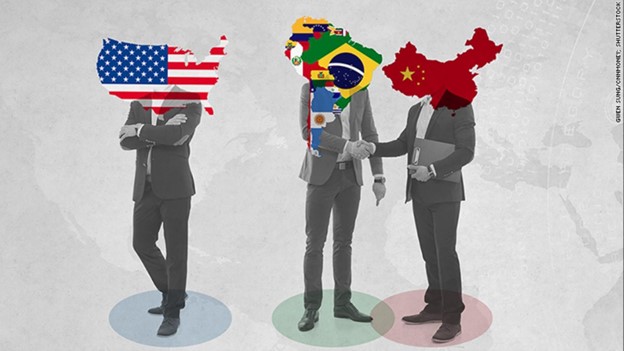Latin America’s political landscape has been significantly shaped by the influence of international organizations. These organizations, such as the United Nations, the Organization of American States, and the World Bank, play a key role in shaping policies and governance in the region. Their involvement has been instrumental in promoting democratic values, human rights, and good
Latin America’s political landscape has been significantly shaped by the influence of international organizations. These organizations, such as the United Nations, the Organization of American States, and the World Bank, play a key role in shaping policies and governance in the region. Their involvement has been instrumental in promoting democratic values, human rights, and good governance practices in Latin American countries.
International organizations have been actively involved in supporting political reform efforts in Latin America. They provide technical assistance, financial support, and guidance to governments in implementing reforms that aim to strengthen democratic institutions, promote transparency, and combat corruption. For example, the United Nations has been instrumental in supporting electoral reforms and promoting human rights in the region.
The influence of international organizations on political reform in Latin America highlights the importance of global cooperation in addressing common challenges and promoting democratic values. By working together, countries in the region can learn from each other’s experiences and best practices, ultimately leading to more inclusive and effective governance.
Corruption and Its Impact on Governance
Corruption remains a major challenge to governance in Latin America, undermining the rule of law, eroding public trust in institutions, and hindering economic development. Political reform in the region requires addressing corruption at all levels of government and society.
Latin American countries have made efforts to combat corruption through legal reforms, anti-corruption agencies, and transparency initiatives. However, more needs to be done to effectively tackle this pervasive issue. Strengthening accountability mechanisms, promoting transparency in public procurement, and empowering civil society to monitor government actions are essential steps in combating corruption.
Addressing corruption is crucial for promoting good governance and building trust in democratic institutions. By rooting out corruption and promoting transparency, Latin American countries can create a more conducive environment for political reform and sustainable development.
Judicial Reforms and the Rule of Law

Image by : Yandex
Judicial independence is crucial for upholding the rule of law and ensuring accountability in Latin America. Reforming the legal system is key to promoting transparency, combating corruption, and protecting human rights in the region.
Many Latin American countries have undertaken judicial reforms to strengthen the independence of the judiciary and improve access to justice. These reforms aim to enhance the efficiency and effectiveness of the legal system, promote judicial transparency, and ensure equal treatment under the law.
By investing in judicial reforms and upholding the rule of law, Latin American countries can create a more just and equitable society. A strong and independent judiciary is essential for safeguarding democracy, protecting human rights, and promoting political reform in the region.
Electoral Systems and Democratic Participation
The design of electoral systems has a significant impact on democratic participation in Latin America. Different electoral systems can either enhance or hinder citizen engagement in the political process, affecting the quality of democracy in the region.
Latin America faces challenges in its electoral systems, such as low voter turnout, lack of representation for marginalized groups, and electoral fraud. Reforming electoral laws and practices is essential for promoting inclusive and fair elections, increasing voter participation, and strengthening democratic institutions.
By adopting more proportional and inclusive electoral systems, Latin American countries can empower citizens to participate in the political process and hold their leaders accountable. Ensuring free and fair elections is fundamental to promoting democracy and fostering political reform in the region.
Role of Civil Society in Political Change
Latin America’s civil society plays a crucial role in influencing political change and promoting democratic values. Civil society organizations, such as non-governmental organizations, advocacy groups, and grassroots movements, are instrumental in holding governments accountable, advocating for social justice, and driving political reform.
Civic engagement is essential for promoting transparency, accountability, and good governance in Latin America. Civil society organizations provide a voice for marginalized communities, monitor government actions, and mobilize citizens to participate in the political process.
By strengthening civil society and promoting citizen engagement, Latin American countries can build a more inclusive and participatory democracy. Empowering civil society to advocate for political reform and social change is essential for creating a more just and equitable society in the region.
Media and Freedom of Expression
The media plays a critical role in shaping political reform in Latin America by providing information, fostering public debate, and holding governments accountable. However, challenges to freedom of expression, such as censorship, violence against journalists, and media consolidation, threaten the independence and effectiveness of the media in the region.
Media outlets in Latin America face pressure from governments, political elites, and powerful interest groups, limiting their ability to report objectively and hold power to account. Protecting freedom of expression and promoting media pluralism are essential for ensuring a vibrant and independent media landscape in the region.
By safeguarding freedom of expression and promoting media diversity, Latin American countries can create a more informed and engaged citizenry. A free and independent media is essential for promoting transparency, accountability, and political reform in the region.
Education and Political Awareness

Image by : Yandex
Education plays a crucial role in shaping informed political decisions and driving political reform in Latin America. Access to quality education empowers citizens to critically analyze information, participate in the political process, and hold their leaders accountable.
Political awareness is essential for promoting democratic values, fostering civic engagement, and building a more inclusive society in Latin America. By investing in education and promoting civic education programs, countries in the region can empower citizens to actively participate in the political process and advocate for social change.
By promoting education and political awareness, Latin American countries can create a more informed and engaged citizenry. Empowering citizens with knowledge and critical thinking skills is essential for driving political reform and building a more inclusive and participatory democracy in the region.
Future Prospects for Political Reform in Latin America
Despite progress in political reform efforts, Latin America continues to face challenges in implementing reforms and strengthening democratic institutions. Political polarization, social inequality, and institutional weaknesses pose obstacles to sustainable and inclusive political change in the region.
Increasing citizen participation in political processes is essential for driving political reform in Latin America. Empowering marginalized communities, promoting social inclusion, and fostering dialogue among diverse stakeholders are key steps in building a more representative and responsive democracy.
By working together to address common challenges and promote democratic values, Latin American countries can overcome barriers to political reform and create a more just and equitable society. Building a culture of accountability, transparency, and citizen participation is essential for ensuring sustainable political change in the region.
















